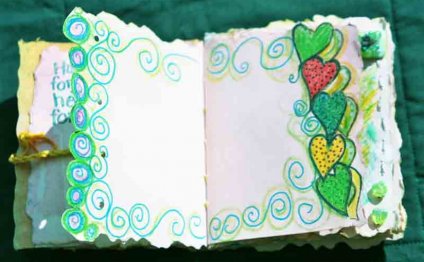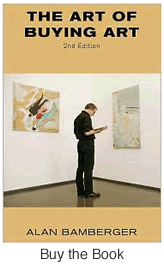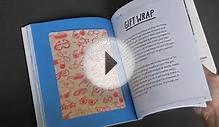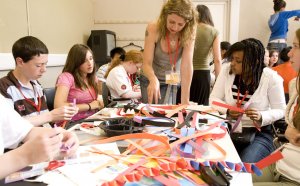
Art Workshop ideas
 Teaching artist workshops can positively impact your artistic bottom line in a variety of ways. Not only can you use them as a way to earn extra income, but also to increase your effectiveness at creating and publicizing your art. Workshops are additionally preferable to non-art-related income producing options because they allow you to continue working with art and don't require large commitments in terms of time, energy, preparation or overhead.
Teaching artist workshops can positively impact your artistic bottom line in a variety of ways. Not only can you use them as a way to earn extra income, but also to increase your effectiveness at creating and publicizing your art. Workshops are additionally preferable to non-art-related income producing options because they allow you to continue working with art and don't require large commitments in terms of time, energy, preparation or overhead.
The most immediate and obvious benefit of conducting workshops, of course is that they are a good source of supplemental income. A single workshop can net you anywhere from several hundred to over a thousand dollars. Teach one per month and you can see how the money adds up.
Money isn't the only reason for holding workshops, however, and for some artists, not even the primary one. For example, a workshop can stimulate your own creative impulses, help relieve artist's block, or result in new ideas and inspirations for future work. These are some of the fringe benefits to being around new people, amateurs and first-timers experimenting and creating whatever they feel like. Even though you're the one doing the teaching, beginners in particular are not bound by convention and tend to engage in original techniques and approaches that experienced artists who are more set in their ways might overlook or not think of. Everyone benefits- you as well as your students.
Selling art is another benefit of teaching workshops. Holding them in your studio, for example, allows you to display a good selection of your art for attendees to observe and appreciate while they're learning. Not only do they see this art as the backdrop, but during the course of their instruction you can talk about how you make it, and help them understand it on additional levels beyond the visual. As they become increasingly familiar and informed about it, they feel less intimidated, more comfortable and- here's the good news- more inclined to buy it if they like it.
Increasing your overall exposure and profile in the arts community will likely also result from conducting workshops. For one thing, you'll be able to add participants' names to your email list for subsequent workshops, shows and open studios. Those who enjoy your workshop experience tend to return for shows as well as additional workshops, and often bring friends who they think may be interested in your art or in attending your workshops as well.
If you advance to the point where more serious artists start attending your workshops, potential ancillary opportunities increase even more. Artists who teach other artists in their workshops report that they're great ways to network. Participants share information about events, arts organizations, venues for having shows, personal contacts, art techniques, selling, publicity, good resources for buying supplies, and more. In general, artists who maintain good consistent relationships and contacts with other artists are more effective at creating and presenting their art than those who go it alone.
Some enterprising artists further augment workshop income by selling art supplies. For example, you can give participants the option of bringing their own materials or paying to use yours. You might also consider participating in art store or website affiliate programs or possibly even arrange sponsorships with certain manufacturers or companies to represent their products.
Lastly, workshops are a great way to gain teaching experience and improve your overall ability to talk about your art in public. Over time, they can lead to speaking engagements or appearances as guest or resident artist at schools, colleges, recreational centers, adult or continuing education programs, community centers, and teaching or workshop opportunities in other cities.
People attend artist workshops for a variety of reasons and often choose according to how the events are portrayed and what's being offered. Many of those who sign up have little or no previous experience with art and merely want to relax, have fun and explore their creative sides. Some are even uncomfortable or intimidated around art and want to become more familiar with it. Others want to take art up as a pastime but not invest large amounts of time or effort in ongoing programs of study. Trained artists usually attend them in order to acquire new skills or learn specialized techniques outside of their areas of expertise.
Artist workshops ordinarily run from four to six hours and cost anywhere from $50 to $350, sometimes more. Artists who are beginners at teaching workshops might consider sliding scales in order to attract more participants. Likewise, artists who teach more expensive workshops can also use sliding scales so that people who can't afford the full fare can still attend. Offering payment levels is not generally a problem in terms of students taking advantage because they really want to be there and typically pay the most that they can.
Two of the most important criteria for successful workshops are that a complete method or technique be advertised and taught, and that each student come away with a finished work of art. This gives students a feeling of mastery and accomplishment. Not only have they learned something new, but they also have "diplomas" to show for it.
Another advantage of workshops as opposed to formal courses of study is that you can make them less structured and more fun and social. Attendees will still learn, of course, but they'll be able to do so in the relaxed and casual setting of your studio or home. So if you're thinking about conducting a workshop for the first time, don't forget to make it fun. This is one of the great advantages you have over more traditional and structured forms of art education when it comes to attracting participants.
YOU MIGHT ALSO LIKE



Share this Post
Related posts
Art Workshops
Our hands-on art classes are taught by artist-teachers, and frequently inspired by art on view in the Gallery. We teach…
Read MoreArt Workshops in Italy
With Nora Venturelli   “Umbria: Sole e Terra” is a summer landscape painting and drawing workshop designed to…
Read More





